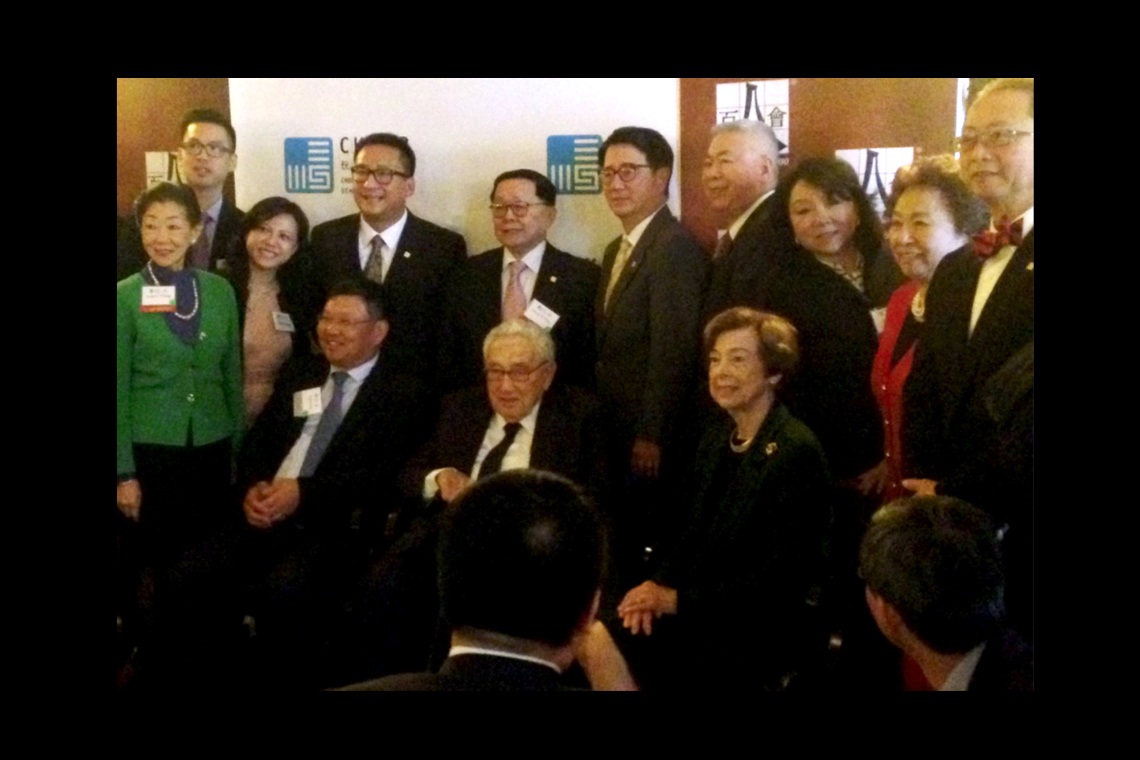Optimism from veteran participants in U.S.-China relations
At an event in New York, Henry Kissinger and other distinguished panelists expressed hope amid uncertainty about the new American administration.

On December 2 in Beijing, Chinese president Xi Jinping met Henry Kissinger, considered by many the architect of contemporary U.S.-China relations. Less than 24 hours later, president-elect Donald Trump picked up a phone call from Taiwanese president Tsai Ing-wen. The direct contact between the two leaders upended nearly four decades of U.S. government convention initiated by Kissinger and others in 1979. However, despite Trump’s willingness to forgo diplomatic protocol and apparent intention to confront China rather than cooperate with it, Kissinger said that he is “optimistic that the cooperative way will prevail.”
He was speaking at an event in New York City titled “U.S.-China Relations in the Trump-Xi Era.” On Wednesday, The China Project published a short report on comments that Henry Kissinger made at the event. What follows is a more detailed review, including opinions voiced by other panelists: Cheng Li, director of the Brookings Thornton China Center and author of Chinese Politics in the Xi Jinping Era, Bing Xiang, founding dean of the Cheung Kong Graduate School of Business, and Frank Wu, chairman of the Committee of 100, who spoke to The China Project in an interview after the panel.
Kissinger and Li both expressed hope that U.S.-China relations would generally stay their course and that Trump would eventually decide to not “tamper with that matrix,” as Kissinger labeled the complex U.S.-Taiwan-China relationships. In addition, Kissinger cited the “unusually restrained” response of Chinese government officials to Trump as evidence that China shared his view, while Li took Trump at his word that he understands how to negotiate with Chinese people and has read books about China, including Kissinger’s On China.
Kissinger and Li were then asked if we had reached a “turning point” in U.S.-China relations, and they gave contrasting answers. Kissinger noted that with every new administration and leadership change, there is a possibility of “revolution.” However, he points out that we have — through eight administrations, on a bipartisan basis — consistently seen it as in our collective interest to cooperate with each other, so this probably will not be a turning point. Li stated that it is likely a turning point, though not necessarily for the worse, as now the U.S. and China both have strong personalities for leaders. Trump in particular, Li said, will either be very successful or a huge failure.
Wu, when reached for later comment, disagreed with the question. He pointed out that strong forces of globalization have been in place and shaped China to such a degree that a “turning point” metaphor is unhelpful. “We’re always at a turning point,” he said. “Ten years ago, Facebook was nothing. Five years ago, Twitter was nothing. Alibaba, WeChat, all of them, nothing.” The turning point metaphor “means that you reach a point, and then you turn…but I think that change is constant,” he explained. He suggested that we instead view a changing world and changing U.S.-China relations with the metaphor of a “continuous circle or cycle,” and added that “we are just at an especially tense point of the cycle.”
Wu also discussed globalization and China’s economic future in an earlier panel with Xiang. Xiang noted several realities in modern China that have changed it rapidly — the adoption of capitalism and economic openness, the explosion of internet access, and rapidly growing inequality very similar to the U.S. — and one reality that hasn’t changed, namely, the Confucian norm of respect for a ruling technocratic elite. He additionally pointed out that China embodies a dependence on global trade and interconnectedness far greater than the U.S. and much more in line with Germany, so he expects it to shy away from open conflict in the South China Sea and advocate like Germany for continued globalization.
Discussion of China embracing globalization and change, and of how this trend is important in defining U.S.-China relations, ran throughout the event. When asked if the populist wave sweeping the U.S. and much of the world would extend to China, Li stated that globalization has no strong opponent in China. He explained that President Xi Jinping’s agenda, including for a China more involved in international affairs, is supported by a groundswell of nationalist support among the public and business community but opposed by a much smaller group of intellectuals — and of course by officials who had benefited from corruption in the past.
The optimistic note struck by the panelists was mirrored by Wu, who commented on the role Chinese-Americans play in relations between the two countries. He discovered from a young age that because of his race, he had no choice but to be perceived as an ambassador of China in America, and believes that “Chinese-Americans can, should, and must play a role in U.S.-China relations.” But he would not be drawn into making any specific predictions about how the relationship would develop in the age of Xi and Trump. “We haven’t seen this before,” he emphasized, speaking of China’s rapid rise. He sees his role and the point of his organization, which co-hosted the event, as building bridges and educating, rather than analyzing and predicting policy.






